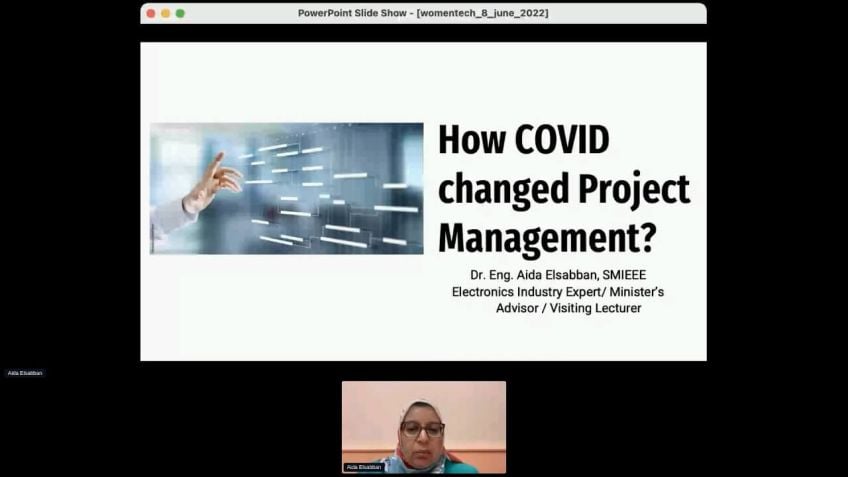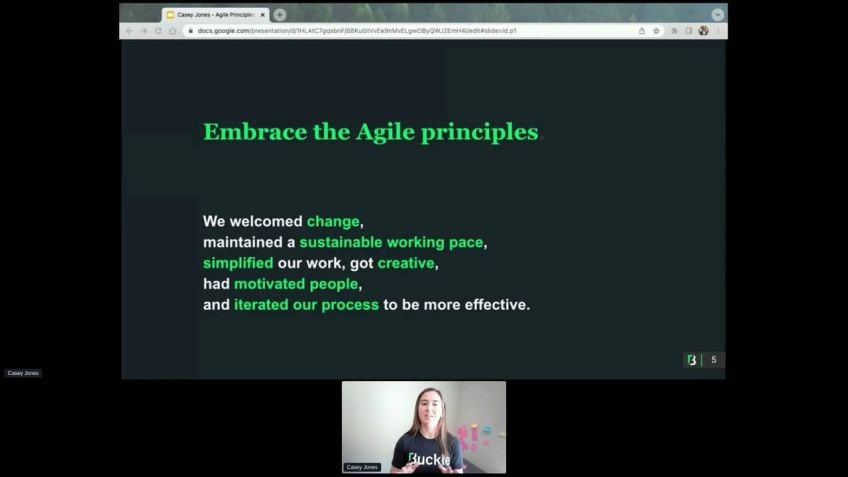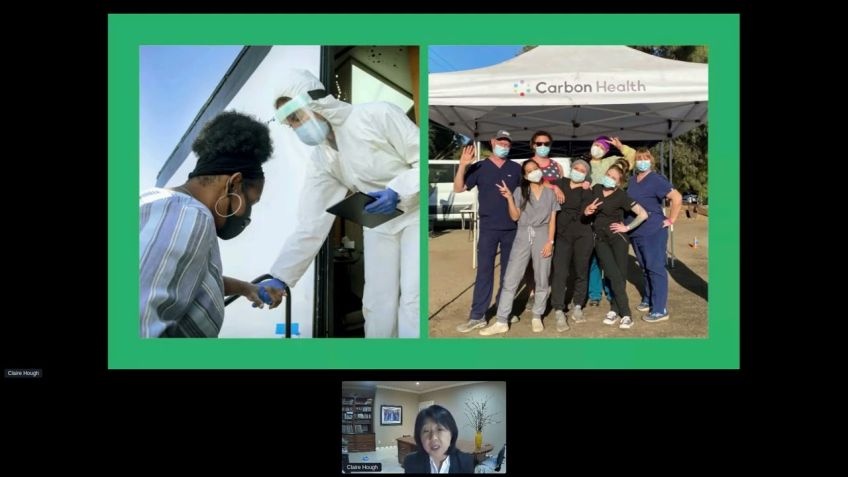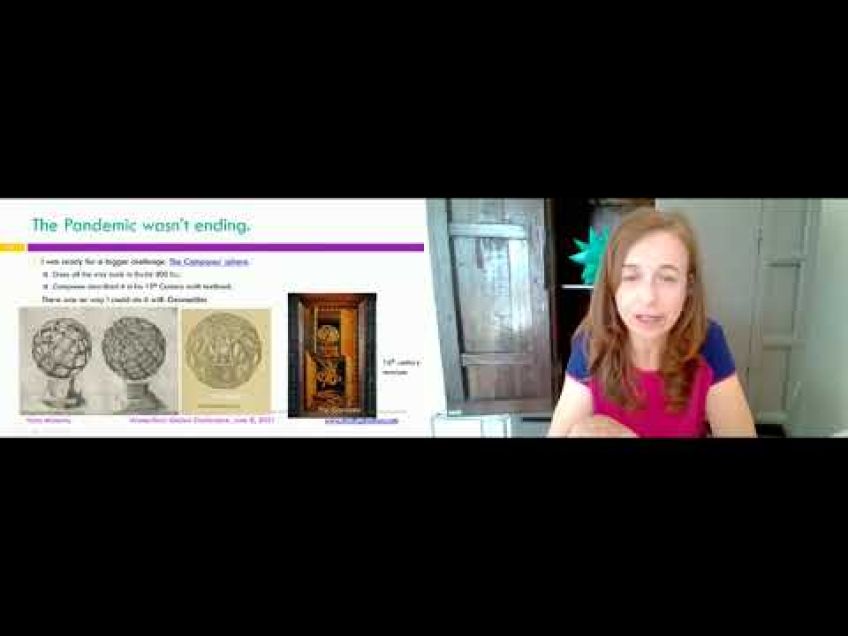How the new normal is shaping the future of talent?
Understanding the Impact of COVID-19 on the Future of Talent
Thank you to the Women Tech Network for this platform and to all of you for joining the conversation about an unexpected and highly influential event - the COVID-19 pandemic. It has significantly affected every aspect of our lives, most noticeably our work lives.
COVID-19 and the Labor Market
In today's talk, we will discuss the future outlook of the labor market amid the COVID-19 pandemic and what this means for you when choosing your future employer.
Fear of Unknown
Switching jobs can be scary and stressful due to the uncertainty it conveys. This fear stems from our limited knowledge about our prospective employer compared to our existing one. Overcoming this fear involves a crucial step: interviewing our potential employer. Amid the current pandemic, there are new unknowns that could impact your decision-making process. Hence, understanding the trends that are here to stay can help you assess if your potential employer can adapt to the new normal.
Impact of Pandemic on Economic Landscape
The pandemic has created a seismic shift in the global economy. Industries involving substantial human interaction like travel and transportation, energy resources retail, hotels, restaurants, and cafes have taken a major hit due to pandemic restrictions.
On the flip side, industries like healthcare and fitness, shipping and delivery, e-commerce, and software development are thriving, offering substitutes for what we can no longer do and helping people adapt to the changes in daily life.
When considering a job change, it's essential to assess the impact of the pandemic on the industry of your potential employer. The key lies in the company's adaptability. Questions to ask during your interview could include:
- How has the pandemic affected the company's results?
- What changes has the company made to adjust to it?
- What is the plan for the future?
Remote Work Revolution
The surge in remote work is another critical consideration. According to a Future Forum research, only 12% of 4700 employees they surveyed want to return to full-time office work, while 72% want a hybrid working model. In response, companies need to adapt to these changes in employees' mindset and start preparing for it right away.
Key questions to ask about remote work policy, ergonomics, workplace perks, and the technologies used can help you evaluate if your potential employer is a suitable fit for you.
Importance of Culture and Motivation
An often overlooked aspect is the influence of workplace culture and motivation during the pandemic. Ask your potential employer about their measures of physical security, their approach towards employee well-being, ways in which they keep employees informed and connected, and their focus on learning and development.
To Summarize
During these uncertain times, understanding how organizations will potentially look like after the pandemic and what matters most to you can help you make the right decision. Don't hesitate to interview your potential employer just as they interview you. This exchange will guide you to an organization that lets your talent sparkle, not just during the pandemic, but beyond. Thank you for your time today.
Video Transcription
And first of all, of course, thank you very much, uh Woman Tech Network for having me for inviting me. It's a tremendous pleasure to be here with you all today. And of course, thank you all very much for uh for joining.So, uh I guess I'm gonna just uh jump in straight uh straight into my topic and begin with the fact that uh you know, back in 2020 the world has experienced something very unexpected and highly influential. And that was of course, COVID-19 pandemic and it was so influential that more than a year after it is still one of the hottest topics. It made a huge impact on each and every single aspect of our lives. So I'm here today to talk to you about what kind of impact it made and and is still making to our work life or in other words, how the new normal is shaping the future of talent, honestly. Um This is a very broad and complex topic which can be addressed from um many uh different angles and we have only 20 minutes uh today. Uh So as I cannot address everything, I decided to narrow it down a bit and talk uh about what we know is probably gonna happen within the labor market as a result of COVID-19 pandemic and uh how this uh how this should affect, how you choose your future employer.
I'm also gonna uh share a couple of vinted examples uh here just to illustrate what exactly uh would you want to look for? Right. So uh just uh just a slide to illustrate what was uh 2020 all about. Uh But uh I want to actually start off with uh looking into the reason of why it is so scary and stressful to change jobs. And the roots uh for that is the biggest fear that human beings have. And that's, of course, is the fear of unknown. This is why changing jobs as whole has always been uh complicated and it's absolutely normal. We spend almost one third of our time working and that's why we want to make the right decision. But the problem is we know a lot about our current employer and very little about the future one, we fear of unknown. And the reason for that is we forget to properly interview our potential employer. This is a very common mistake I've seen since the beginning of my career uh because people are used to being interviewed, but usually forget that at the end of the day, both sides are making a decision and both sides uh has to have to have all the information, uh they need to make the right decision.
Uh But now when Corona hit us, loads of new unknown fields appeared. We hear a lot, um uh we hear a lot of negative information uh about the pandemic, about economic instability, about growing unemployment rates. And that enlarges our fear to change the jobs. Plus there is a lot of speculation around the topic, but no one really knows how the, knows for sure how this new normal will look like. And even um if we were interviewing uh uh our employers before the pandemic, chances are that we're gonna miss to discuss some important aspects which arose as a result of the pandemic. So today, I'm going to talk to you about the trends that most probably gonna stick so that you can address that with your potential future employer and see if it's going to be adaptable enough to survive in the post Pande world. And uh even if it's gonna survive, is it gonna strive or be the most suitable place for you to work? So first, and I uh I'd say heaviest change that the pandemic brought to us uh were the changes in the economic landscape while some industries are crumbling down, others are thriving.
The hardest hit was received by the industry which by nature include a lot of human interaction and simply cannot continue due to the pandemic restrictions. And that of course, are industries like travel and transportation, energy and resources retail, hotels, restaurants, cafes and similar.
And the traffic industries are naturally those which offer, uh help fighting the pandemic offer substitutes for what we can no longer do and simply helps people adapt to, um, to the changes in our everyday life. And that uh those industries are like healthcare and fitness, shipping and delivery, e-commerce, software development and so on. So, um, the most important thing to do in order to feel a bit, um at least a bit safer when changing jobs is evaluating. If the industry with which a potential employer is operating in is under a positive or a negative impact of the pandemic that you can of course, easily do uh on your own and simply Google it. But my advice would be to go a bit deeper here and evaluate uh not only the industry but the employer itself and the thing you need to look for is adaptability because if, if the industry is down, some particular companies can thrive now, so you can have a huge temptation to work for it.
But is it for long? Does the company have a plan? How uh how to adjust after the pandemic is over and vice versa? If the industry is booming, that doesn't necessarily mean that a company is using this opportunity properly. Maybe you just cannot keep up with the growing demand. And uh yeah, let's take our example, right? So Ecommerce and marketplaces are booming and that's a very good sign for vin it, but we did have some struggles at the beginning of the pandemic. We just weren't ready for such an instant and tremendous growth of parcels. So we needed to do some serious rethinking around our shipping. We solve that out successfully, but that's not the end. We know that our competitors are using this opportunity as well. So we know that we need to think ahead if we want to stay on top of the game. So that's the first thing uh what you should ask during the interview, how does the pandemic affected the company's results? What changes has the company made to adjust to it? And what is the plan for the future? Uh This will give you a good glimpse of whether or not a company is adaptable enough to survive during and post pandemic and in turn, whether you might end up praying not to be next in line to get fired. Uh The other thing, uh And I guess the most obvious change that most of us has experienced was of course the remote work and this aspect of the pandemic created the most speculation. Some said that we're never getting back to the offices.
Others says that people are social creatures. So once it's all over, we all gonna want to jump back to the offices as always through slice um somewhere uh somewhere in between those uh the the most extreme ends of the speculation. Uh For example, future forum uh ran research with uh 4700 employees and the majority never want to go back to the old way of working. Only 12% want to return to full time office work and 72% want a hybrid model moving forward. Um Most people like being in the office for different reasons, but at the same time, uh they don't want it to be mandatory simply because we like to be in charge of our own time. Uh linkedin also shared that since 20 since March 2020 they saw four times the number of jobs that offer remote work globally. Uh They also see uh that trend reflecting from job seekers as well. So the volumes of, of uh job search is using the remote filter on linkedin has increased uh approximately 60% since the beginning of March 2020. So wanting to be successful, companies must adapt to this change in employees' mindset and needs to start preparing for it right away.
What you need to ask your potential employers, not only how they see uh changes in uh organizing work, but also how exactly are they preparing for it? What's the policy around flexible working hours? What uh you know how they are uh ensuring ergonomic workplaces at home? What about losing workplace perks and its substitutes? What kind of technologies are they using and why? And all of these things need to be uh need to be addressed because having all uh all of these answers can tell you a lot about your uh employer's uh potential employer's prospects to attract this talent. And you can as well choose the one who suits your individual needs the best. Again, let me give you a couple of examples from vintage life. So we were always quite flexible about working from home, but we understood that some people are choosing to work from the office simply because they don't have an ergonomic workplace at home. So we have uh desks and chairs delivered to colleagues homes. Actually, I'm using uh using that at the moment. Uh We also understood that people are losing office perks such as lunch. So we arranged a food delivery option for those who prefer that. Going further.
We decided on having a hybrid work model and uh we are going to ask our colleagues to come to the office on Tuesday and Wednesday. Uh That way we aim to simplify collaboration. And for the rest of uh days, people can choose where they want to work from, from the apps from home, from where, you know, there are uh many more initiatives that we and other companies are taking when it comes to remote uh remote work or, or, you know, organizing work in general.
So just just ask what exactly those are and choose what matches your needs the most. I also want to talk um about less visible things and mostly culture and motivation and of course, motivation is a very individual thing. But many researches show uh some universal trends, what motivates people the most across various different uh studies. You can find these five things that pop up as the key motivators at work. And that is compensation, job security recognition and appreciation, employee involvement, challenging work and growth opportunities.
The first one is in the nature of work relationship. And the second one is one of the reasons why we are having this talk today. So I won't address these two separately. But the rest uh three are lying in organizations, culture and are a key why employees tend to stick around in some companies rather than uh rather than others, even if most of the companies are offering you job security and fair compensation, you uh somehow have to choose, right.
So the study shows that most of us choose uh choose to stay or go based on uh these three later things. So the danger today is that these three motivators can easily be missed during the pandemic, especially when they require a bit of a different form of expression during these times. So, recognition and appreciation is no longer about uh your manager appreciating the results, uh you've reached uh you've uh reached, but rather recognizing what are you facing during these challenging times. Involvement is not only about being informed or being a part of the decision making, but also about staying connected to your colleagues. And company on a deeper level and growth opportunities are not only about challenging projects but about learning what the changing future will require the most.
Uh If an employer doesn't address these needs, uh at the end of the day, you might feel like there's no difference for what company you do the same job. So let's dive a bit deeper into each of them, stating the obvious, the health of almost all the people on the planet planet is at risk now. So the employees shouldn't think of it. Um Just as an individual problem, they have to ensure measures of physical security for people who chooses or will choose after the pandemic to work from the office. And um and also help those who were actually affected. So that's uh what you should firstly ask what me measures of security, a potential employer uh took once the pandemic hit us, takes now and is planning to take uh take in the future. Another aspect is that even though most of the researchers showed productivity increase when working from home, reality shows that the work life blend extended working hours by approximately 10 to 20% for some people. It was extremely challenging to balance our work and family responsibilities, especially for those with preschool uh child and adding the factor of social isolation, we have not a very tasty cocktail contributing to the reduced mental well being.
So another set of uh of your questions might be targeting this what a potential employer did to firstly measure employee well-being and uh secondly, prevent negative impact on employees mental mental health. Again, let's take a look at uh at a couple of vintage examples. So what we did we arranged once, once the pandemic hit us, we arranged a psychology lectures around the pandemic related topics. We also provided individual sessions with psychologists, uh psychologists uh for those in need. And we have um uh given all of our employees the access to an application called Mind Letti, which is focusing on improving mental well being. So yet again, just ask, you know, what your potential uh employer is doing around these topics and choose what, what matches your needs the most um talking about the connection. Uh So the pandemic might have created an impression that once it hit us, people became uh more connected in the early days of the pandemic. Microsoft mined their client data from Microsoft teams and reported a 200% increase in the virtual meetings with a total of 2.7 billion meetings per day. And that was only uh Microsoft teams where there are plenty of other platforms as well, but these are purely work meetings.
Uh And one of the most important reasons why people want to have a hybrid model of working after time gets a bit calmer is that we are neuro biologically hardwired to connect with other people on a personal level. We use this for business. We use this for our mental well being. Um So we simply miss those gatherings around the coffee machine as well as colleague coming up to our table saying, hey, do you have a minute? Which turns into half an hour brainstorming session, we missed this. And that's why we need to ask our potential uh employer how they approach three different communication aspects, quantity, type and quality. What kind of technologies and channels are uh uh are used for communication across the board? How and how often people get business updates? What about social events?
Uh As the leaders in the company plays critical role in keeping people connected to each other and uh to the organization, you should address these topics with your potential manager during these interviews. How did they adapt to leading remote teams? How do they approach one on ones?
How do they ensure the team spirit is high? You are going to meet your potential future manager uh at some point in the interviewing process. So use the chance to interview them as well. Let's take a look at a couple of examples. Um So what we did since the pandemic hit us, we started having weekly all hands with live interactions with our top management for business updates, for companies priorities and parts and projects. Also, we kept promoting teambuilding budgets so that the teams would think of something fun uh even remotely to stay connected. And we also rolled out a huge leadership training program to help our leaders during these challenging times. So again, just explore um what your potential future employer does uh around these topics. And the last thing is learning and development, right? So upskilling and reskilling employees was an emerging trend. Uh long before the pandemic, it was getting clear that with the technological advancement, a humans uh focus needs to shift to so called soft skills, right? So, uh but once pandemic uh hit us the necessity for this unraveled with the new speed, it became absolutely clear that skills like communication, adaptive to change agility, change management and so on are extremely important for organizations to try.
And if hard skills are relatively easy to uh get learn as well as simply outsource, uh soft skills are extremely difficult to obtain. Given that in these uncertain times when we're focusing on our safety and adjusting to new reality learning and even understanding what to learn is very difficult. Companies need to give a push to their employees if they want to prosper. After this madness, we uh advent um what we did uh again, for example. So we always had our learning budget as one of our perks. So we kept promoting it. But most importantly, we rolled out training program uh called self development. And the aim of this program is um uh to increase self-awareness when it comes to learning. How do you learn? What keeps you away from learning how to uh how to learn when times are ambiguous and, and and these, these sorts of things. So that's why you have to ask your potential employer how they approach learning, what role does learning and development play with an hr function? What are they focusing on in employees development plans? What is the last thing your interviewer learned? That's also can be a good indication.
This can draw you uh quite uh some picture on what growth opportunities will you have and whether your future employer is looking at the at the right direction. So I know I probably didn't say anything groundbreaking today, but I think we all first need to master the basics before going to the pro level. So my main message for you today is think of how organizations will potentially look like after the pandemic. Think what matters most for you personally and start interviewing your potential employer just as they interview you. And this way you will be sure to make the right decision and choose the organization which lets your talent sparkle during the pandemic and beyond. So, thank you very much.





